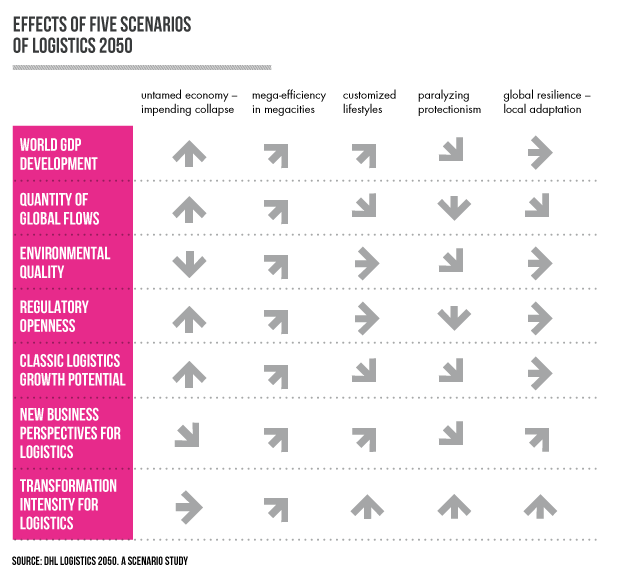![]() 5 minute read
5 minute read
Main logistic and transportation players focus on meeting the objective of limiting the increase in average global temperature to within 2°C, by 2100 (the emissions have to be cut 50% by 2050), the global and personalised future demand, and the natural disaster avoidance. Building the sustainable future is a primary mission for the humanity, let’s have a look on the expert scenarios for 2050 for the industry.
Air attack
How can we move our freight and cargo cheaper, greener and faster through the air? The amount of innovation targeting the aviation industry is eye-opening. The effort of the Solar Impulse Team to accomplish first flight around the world solely on solar power, or the first all-electric self-powered aircraft crossing the English channel give the new perspective to lower the oil dependence and promote the alternative sources in the industry. Renewable energy is not a new subject as the concept of the giant airships. Nevertheless, the theories will become the reality. The Aerocraft ML868 can carry 200 tons with cargo bays larger than any current air, truck or train transport vehicle. The combination of sustainable designs will revolutionize the industry.
Tackling the customization and personalization needs, the Amazon already starts drone shipping providing the same day deliver for the customers. With the next year, the unmanned solar-powered drones like Silent Falcon will become a must for the logistic companies. “Amazon is thinking about logistics and delivery so far ahead of the curve than anybody else, that no matter what direction [delivery] goes in the future, Amazon is going to have thought about it and be a big part of it,” states Morningstar’s R. J. Hottovy. To keep up with the order flows, Amazon has already implemented the robotics in the warehouses and processes 35 orders a minute. The video proves – future has arrived:
Following the future logistics scenarios, the globalisation impact of the logistic will continue to grow as long as the technology breakthrough and the environmental sustainability will succeed. Otherwise, the regional and local trade will take the central place due to high oil prices.
2050
by DHL
Foresight experts from Z_punkt have designed the “Logistic 2050”[nbsp]scenario for the Deutsche Post DHL. Based on the input from the international specialists, Z_punkt has produced five possible outcomes for the year 2050.

The first scenario in the study is pretty much the consequences of what PwC described as “The restricted, but still ignorant world”. The international governance toward sustainable future and lowering the environmental impact has failed. The untamed[nbsp]consumption has multiplied the volume of global trade over the 40 years. Strong western ambitions to develop own economies caused the stall shifting the epicenter of finance, trade and consumption to Asia. The global supply chain has increased the efficiency breaking the balance of sustainability principles. As the result, the world is left with the disastrous global warming and natural disasters, which frequently disrupt the supply chains.
The second scenario explains the impact of the urbanisation: “Mega-efficiency in megacities”. The plot predicts the massive creation of megapolises, technological and robotical breakthrough, and last but not the least, significant sustainable development. The shift towards green growth is driven by fully automated lifestyle and urban and global high-tech[nbsp]infrastructure. Nevertheless, most of the futurists are sceptic about technology solving the tragedy of commons described by Garrett Hardin back in 1968.
The individualization and customization trends as the main factor of development is described in third scenario “Customized lifestyle”. While 3D printers take the place of home electrical devices expanding the regional[nbsp]trade systems, the raw materials and data flow stay global. Recycling and closed material loops are on the rise. Personal overproduction increases the energy and resource usage warming the climate on course to a 3,5°C. PwC predicts the growth of at-home additive manufacture as well.
“Paralyzing Protectionism” argues the reverse of the globalization caused by the economic and nationalistic burden, as well as by protectionist barriers. Shortage of resources and high energy prices drive countries apart leading to international conflicts. No global governance towards environmental cooperation is possible. Logistics becomes a strategic industry.
DHL’s last scenario “Global resilience – local adaptation” in 2050 corresponds with PwC’s “The de-globalized and clean world” in 2030. Low energy prices, automized manufacture, sustainability awareness lead to the growth of regional trade. The environmental catastrophes block the global logistics causing financial loss. As the result, security turns to be the top priority. Increased natural risks make the pipelines unreliable, consequently, trucks, trains and ships start to replace them shipping water, oil and gas. The frequency of household deliveries slows down the pace as the consumption levels are lowering.




